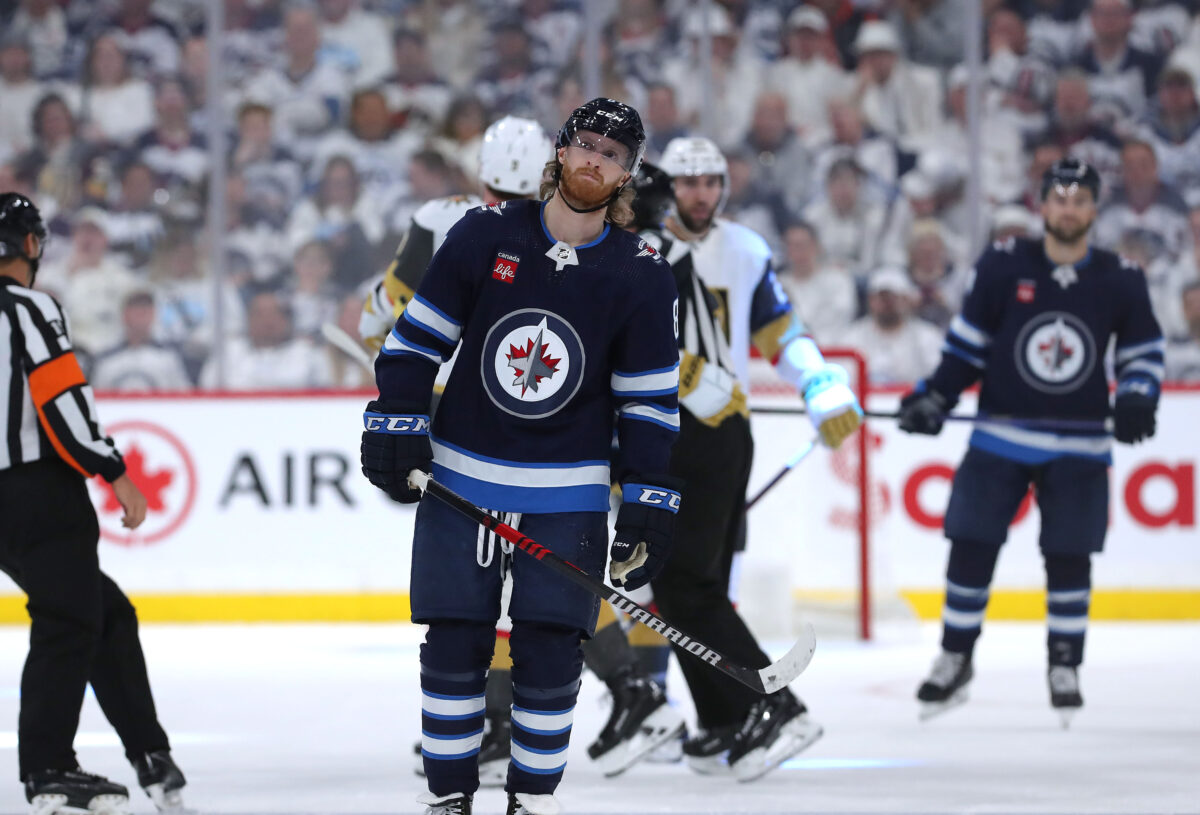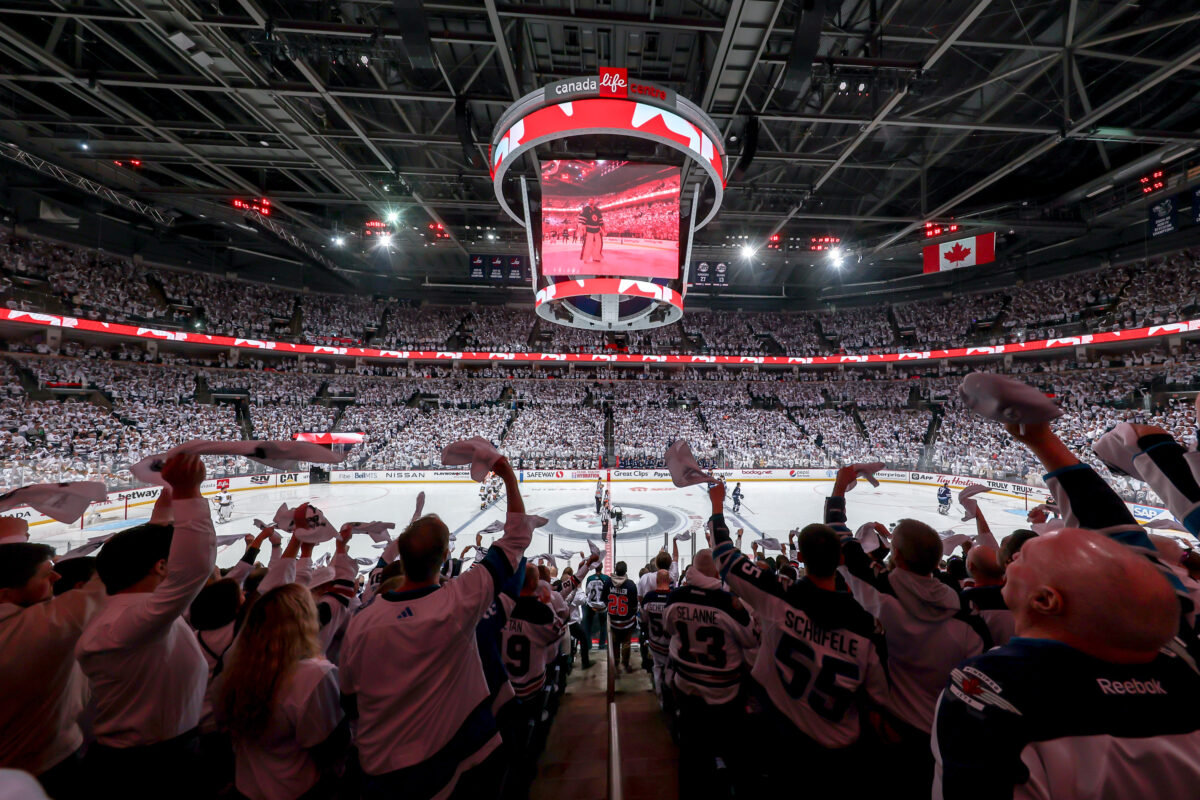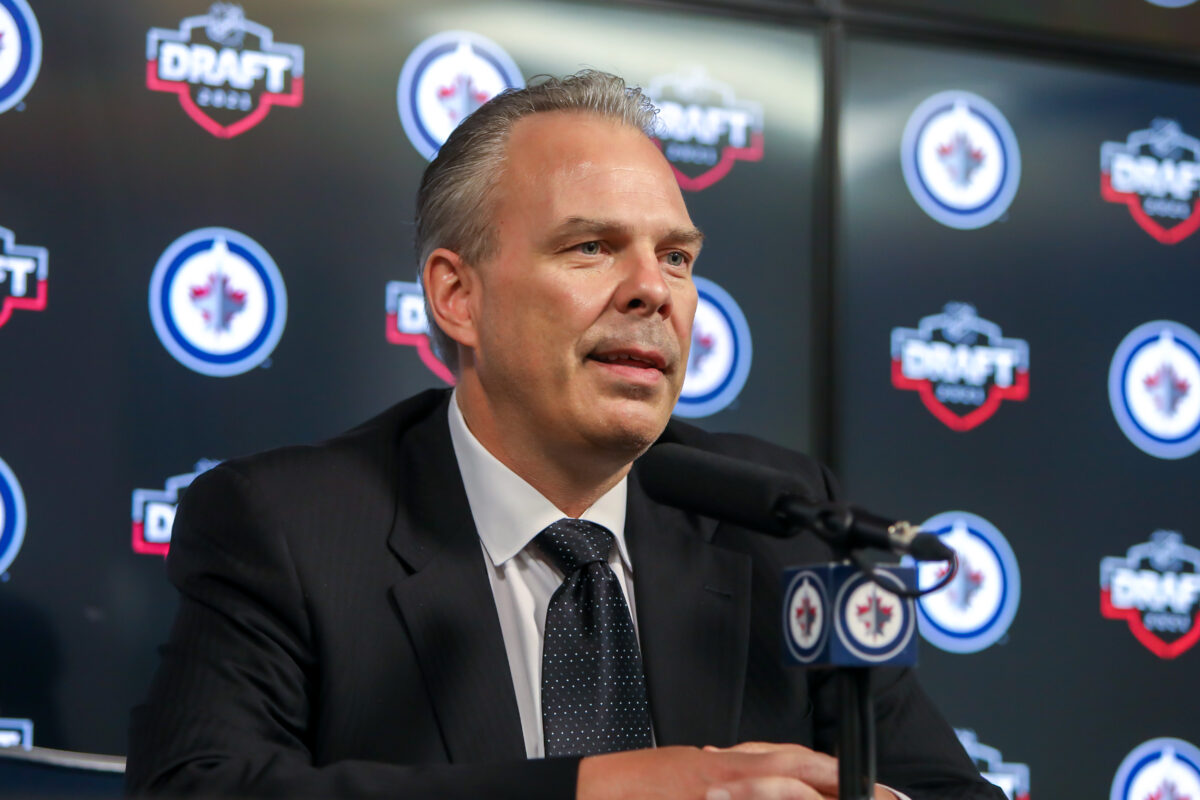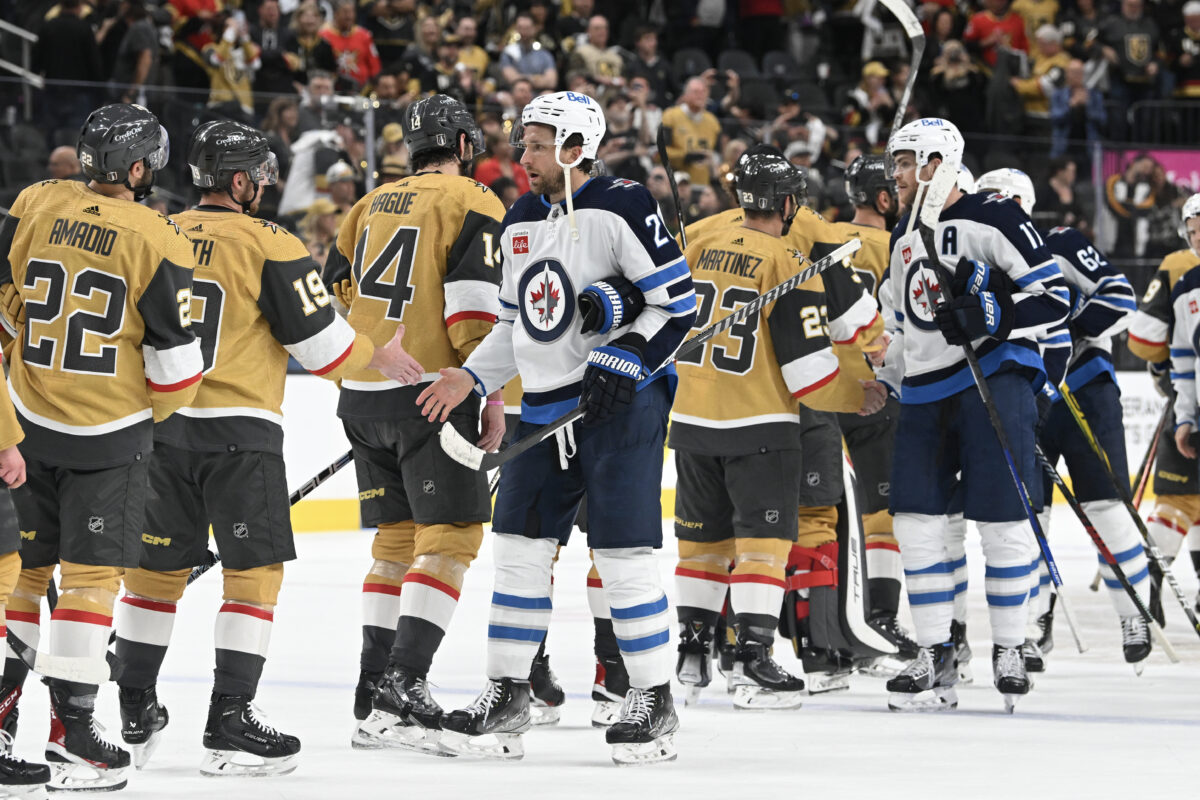On Jan. 15, the Winnipeg Jets were first in the Western Conference.
On April 28, they were the first team eliminated from the postseason.

Despite returning to the playoffs in 2022-23, the Jets cannot and should not be satisfied with their season, which was full of wasted opportunities and rife with the same issues as years past.
Jets Squandered Strong First Half
The only reason the Jets had to play the Western Conference champion Golden Knights in the playoffs — where history would ultimately repeat itself with the Jets falling in five as they did in 2018 — was that they squandered a strong first half.
Under new head coach Rick Bowness, the team got off to a wonderful start and it seemed a lot of the issues with accountability, effort levels, and egos had been sorted out. On Jan. 15, they were 29-14-1, had banded together through injury adversity, and the sky seemed to be the limit as they sat near the top of the Central Division and even the Western Conference.
But then, over a three-month slump, the old problems emerged and the team tuned Bowness out, even though they knew how successful they could be when playing his way. The scorers were mostly silent, the power play was completely impotent, the over-reliance on Connor Hellebuyck reemerged, and the dedication of some so-called leaders once again fell into question.
The Jets tumbled down the standings badly, but snapped out of the extended slide just in time to snag the second Western Conference Wild Card spot. By winning six of their last seven meaningful games to clinch in the second-last game of the regular season, they avoided the dubious distinction of being the first team in NHL history lead a conference more than halfway through a season but miss the playoffs.
The Jets dominated Game 1 against the Golden Knights, but that was the only 60-minute effort they turned in. Over the final four games, all the problems from the second-half slide remerged, culminating in a total non-effort when facing elimination in Game 5.
Jets’ Core Fails to Deliver Again, Bowness “Disgusted”
After the Game 5 debacle, a red-hot Bowness didn’t hold back when speaking on an issue that’s existed for years. Injuries to Nikolaj Ehlers, Josh Morrissey, and Mark Scheifele in the series undoubtedly put the Jets at a huge skill deficit, but injuries weren’t the real reason they lost the series or fell apart in the second half.
The real reason was much more longstanding: the core “difference makers” — Kyle Connor, Pierre-Luc Dubois, Scheifele, and Blake Wheeler, among others — are a fragile bunch who have trouble feeling motivated to win and do not possess strength of character to consistently commit to working hard. As soon as things don’t going well for them, they refuse to be coached and collapse in on themselves.
With all due respect to the bench boss, the problems didn’t start earlier this year, but rather all the way back in 2019. Remember when the Jets fell apart down the stretch that season and lost to the St. Louis Blues in the first round, with former head coach Paul Maurice’s “ruffled feathers” comments indicating egos were running rampant and the locker room was divided?
More recently, remember last season when veteran Paul Stastny called out the team for their complacency in a similar way Bowness did on more than one occasion? None of this is new.
“These guys are the players…. they’re the ones that are going to take us to the championship,” Jets’ GM Kevin Cheveldayoff said on March 3, just after the Trade Deadline.
He was wrong.
They may win enough games when they’re feeling good to squeak the Jets into the playoffs, but they’re far from a crew built for a long and arduous Stanley Cup run.
If they weren’t motivated to play well in an elimination game, when would they be?
Jets Cannot Use Playoff Berth As Excuse to Stick to the Status Quo
In early April, before the Jets made the run that punched their ticket, we explored whether qualifying for the postseason was actually the best thing for the franchise’s long-term trajectory.
Related: Would the Jets Making the Playoffs Actually Be a Good Thing?
Even though the Jets were bounced quickly by the Golden Knights and their systemic flaws were exposed yet again, it will be interesting to see if True North uses the playoff berth as a justification to stick to the status quo. It’s set them up to use an “everything’s fine, we battled hard and made the playoffs, we’re staying the course,” sort of narrative.
True North is extremely loyal to its personnel, but such an attitude this offseason would be completely unacceptable and the best way to march the Jets toward irrelevance.
The “honeymoon era” in Winnipeg is long gone. Jets fans are no longer happy to just have a team — they want to watch competitive hockey on a consistent basis and know their team is committed to winning. Many feel the overall product True North offers is not worth the price they charge, and the decreased attendance lays that bare.
This season, despite not having any COVID-19 vaccination requirements for entry and the Jets marketing quarter-season packs and promotional prices aggressively, there were an average of 1,276 empty seats per night at Canada Life Centre.

True North didn’t build itself any good will, either, with their recent “Forever Winnipeg” season ticket drive campaign. Many perceived the messaging and use of visuals in the ad of the Jets 1.0 leaving town in 1996 as a veiled threat: “If you don’t buy tickets (again,) we could leave (again.)”
Big Changes Are Coming (Or, At Least They Should Be)
Cheveldayoff’s “run it back” gamble — his hope that a new coaching staff could get a lot more out of the same personnel than the old regime — ultimately backfired. For the team to move forward and change the culture of complacency, big changes are required. It’s the only way to maintain fan interest and avoid being stuck in the “mushy middle” for a prolonged period.
Starting at the top, the teams Cheveldayoff have assembled have won just three playoff series in 12 seasons and have lost in the first round three times (four times including the best-of-five Qualifying Round of the summer 2020 bubble playoffs.) In a results-based business, that’s not a whole lot of good results. True North needs to give serious thought as to whether Cheveldayoff, the GM since relocation, should be the on to conduct a rebuild.
An organization serious about winning would have parted ways with Cheveldayoff a long time ago and many GMs have been axed lately for much less. The Pittsburgh Penguins missed the playoffs this season for the first time in 16 seasons and they fired GM Ron Hextall and president of hockey operations Brian Burke. The Calgary Flames missed the playoffs this season after being considered a Stanley Cup contender coming into it, and parted ways with GM Brad Treliving.

Make no mistake — a rebuild is coming. Cheveldayoff — or his successor — only have one choice: kick and scream against it or embrace it.
Dubois and Scheifele, the team’s two top centres, both need to be traded as they are unrestricted free agents after next season who don’t seem to have much interest in still being Jets. Dubois had a strong season with a career-high 63 points but is on record saying he wants to play for the Montreal Canadiens and checked out in the playoffs. Remember “The Shift” — his last as a member of the Columbus Blue Jackets, where he purposely did nothing to show his displeasure with the organization? Most of his playoff shifts after Game 1 looked like that.
Scheifele set a career-high in goals with 42 and was reenergized under the first half under Bowness, but then fell back into his old lazy and defensively-inept ways. The Jets’ first-ever draft pick has openly mused about his future with the team in the past, and after being knocked out of his third-straight playoffs with either injury or suspension, the organization needs to ensure he’s played his last shift in Winnipeg.
Related: Jets’ Scheifele Has Quietly Quit on His Team; Trade Request Coming?
Blake Wheeler, the former captain, either needs to be traded for draft picks and prospects or bought out of the last season of his $8.25 million contract. A past-his-prime veteran has no place on a rebuilding team, where young players should get the bulk of the opportunities.

On the back end, Neal Pionk and Nate Schmidt were both overpaid this season for what they provided, combining for a near $12 million cap hit. Moving them would clear out a defensive logjam that is preventing hardworking youngsters such as Declan Chisholm, Leon Gawanke, or Ville Heinola (remember him?) from having chance to break into the NHL.
Hellebuyck — the man most responsible for the successes the Jets have had since his rookie 2015-16 season — would probably request a trade if a rebuild occurs. Hellebuyck, also a UFA after next season, is on record saying he only cares about winning a Stanley Cup.
Running it back again and finishing in the middle of the pack in 2023-24 would upset the fans more than making them go through some losing seasons to ultimately create a true contender. Running it back could also drive Bowness out of town. He is not blameless for the Jets’ struggles, but is an intelligent and respected hockey mind with more than 40 years of experience that True North should not want to lose.
At 68, Bowness is at an age where most men are retired, and he even said upon coming aboard that he “didn’t need a job.” If the changes don’t come, it’s not hard to envision him resigning to enjoy his golden years with his wife Judy rather than taking on the aggravation that would come with another season of trying to get through to such a stubborn bunch.
With everything and everyone in play, this offseason is bound to be the most fascinating in Jets 2.0 history. It’s become crystal clear that the only way the organization will ever have a season they can truly be satisfied with is if they decide to leave this era behind.